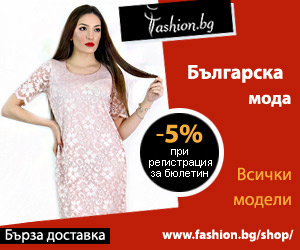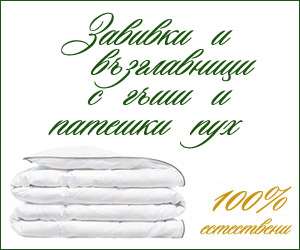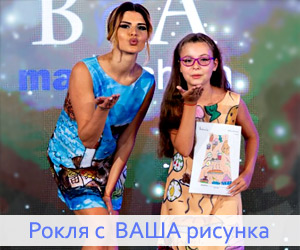How textile clusters can strengthen the European economy
Silvia Kabaivanova
The first fully virtual European Cluster Conference brought together more than 900 stakeholders, policymakers, cluster managers, researchers, entrepreneurs and the public to discuss and share current and future priorities for cluster policies and developments to support sustainable industry development and interregional cooperation, and to build connections between Europe’s value chains, clusters and ecosystems.
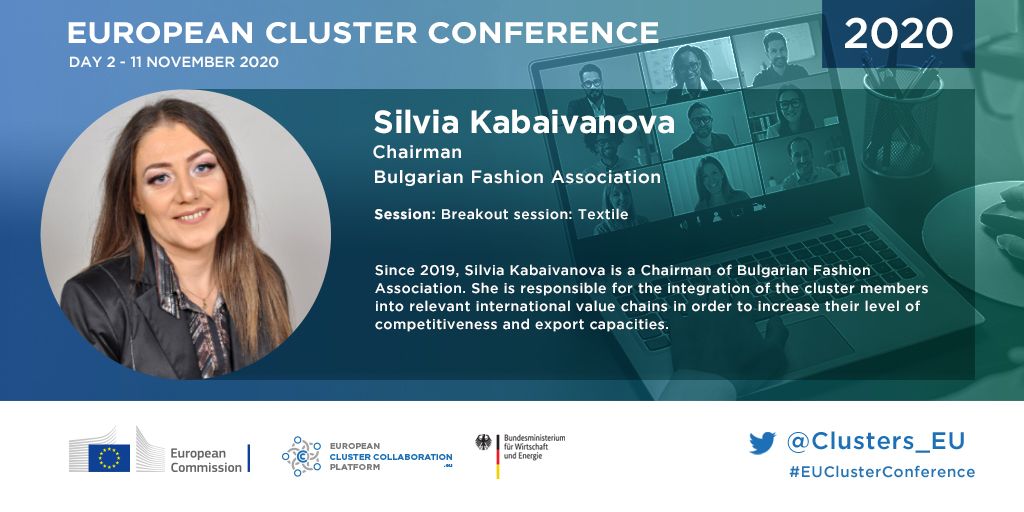
As a Chairman of Bulgarian Fashion Association I made a speach about How clusters can strengthen the European economy in the textile sector.
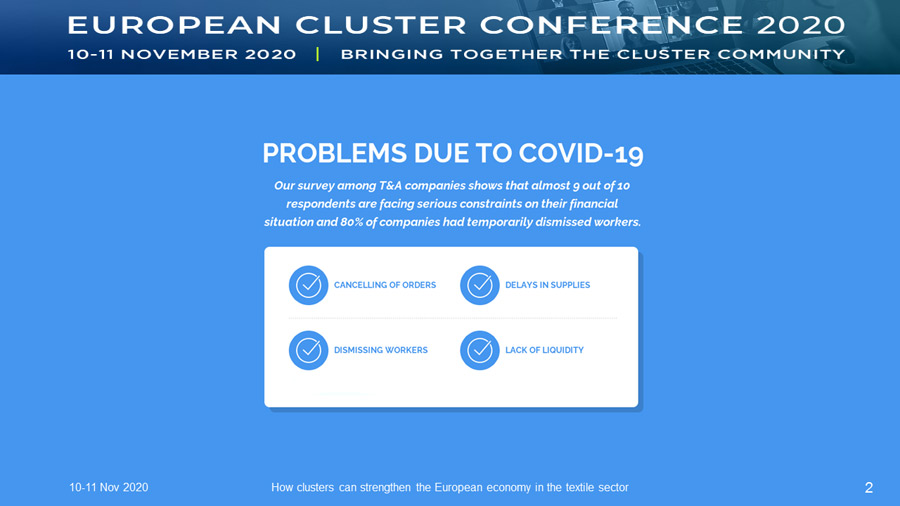
"The current situation caused by COVID-19 has led to a dramatical decrease of orders for T&A manufacturers. A survey among them shows that almost 9 out of 10 respondents are facing serious constraints on their financial situation and 80% of companies have dismissed workers. Some of the biggest companies in Bulgaria have laid off hundreds of workers simultaneously. Their partners from Western Europe have been reducing their orders dramatically and due to that they felt lack of liquidity and could not keep their employees. At the same time tightened border controls due to the coronavirus are causing a disruption in the supply chain and delays in production.
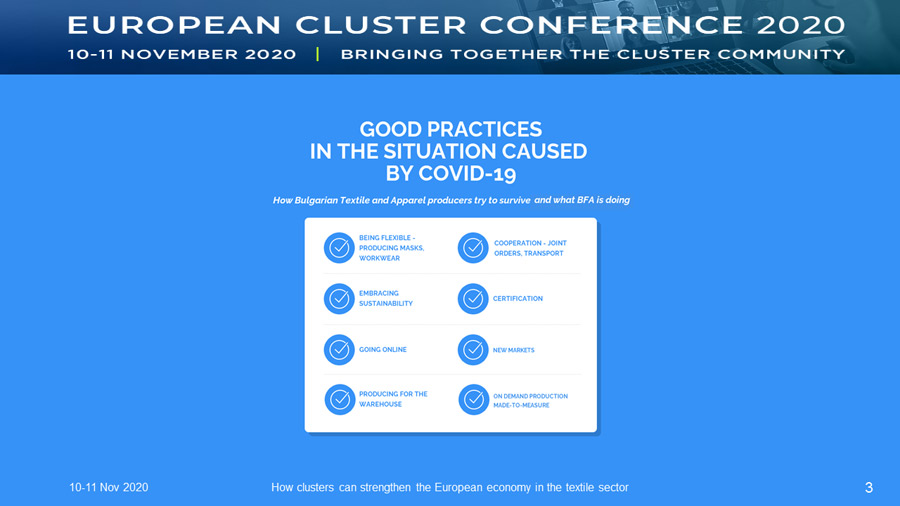
Many producers are in a really hard situation and they don’t expect it to change until May next year, so they look for ways to survive. One way to do that is by being flexible. Most of Bulgarian producers were involved in sewing masks, but some explained that it was very difficult to be certified and sell on different EU markets. Instead of sewing formal garments some of them switched to sewing workwear, uniforms and products for the home. To reduce costs they share transport and other services. They get large orders, split them to several smaller manufacturers and in this way help each other. What we as a cluster do is to help them embrace sustainable practices and to find new markets. Some companies that used to work only as contract manufacturers started developing their own collections and we are helping them to sell online. The bigger manufacturers that can afford to keep their workers even though they don’t have many client’s orders are producing goods for their warehouse hoping to sell them when the situation improves.
A good practice among some companies in the menswear sector is on demand production of made-to-measure shirts and suits, which eliminates the risk of producing goods that are not sold and is a good example of saving resources.
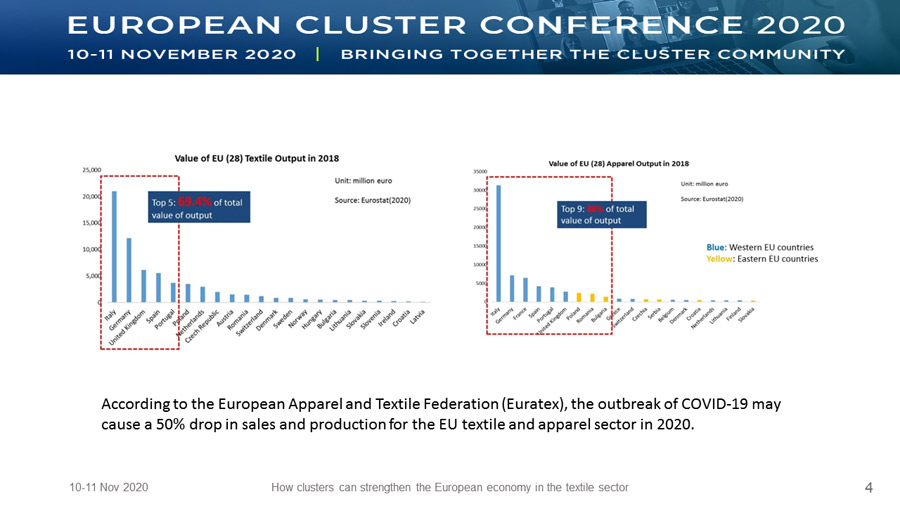
On the following two charts you can see the value of EU T&A outputs in 2018. According to the European Apparel and Textile Federation, the outbreak of COVID-19 may cause a 50% drop in sales and production for the EU textile and apparel sector this year. And we see that it is already happening.
Up to 8% of total industry employment in the European union (about 158 000 jobs) and 6% of companies (about 13 000) could disappear by the end of next year, according to a report from Euler Hermes.
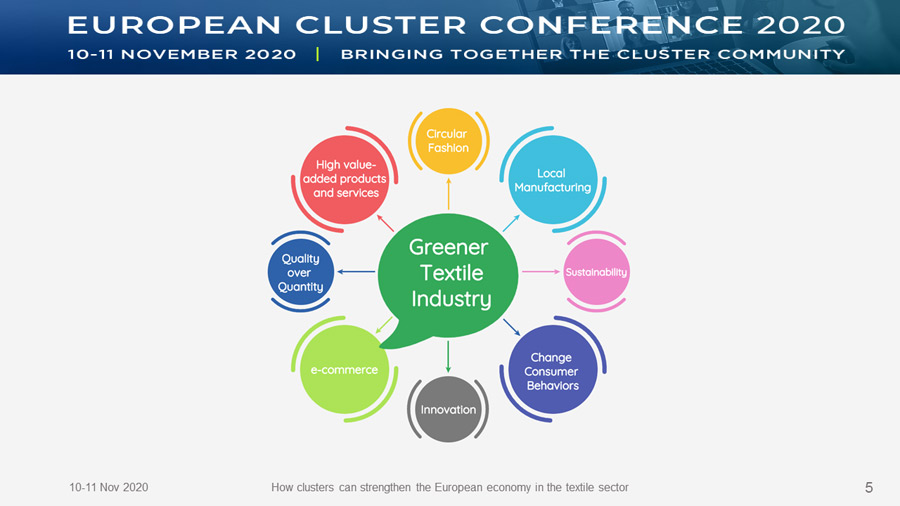
So, what is the solution? When things start to get to normal the textile industry will be changed. And the role of clusters is to help it recover and become greener.
Now we have a chance to make the brands understand that the best strategy for them is sustainability. The future of European T&A industry is to produce high value-added products and services and to put the emphasis on QUALITY OVER QUANTITY. Linking science to clusters will be very useful so that new innovative technologies and materials are developed and put into production. Also, clusters should support circular fashion by helping the creation of a market for recycled materials and recycled products. A shift from imports to Made in Europe products will make a major boost for the local T&A industry.
An important role of clusters is to make strong campaigns to change consumer behavior, because everything starts with the consumers. When there is a demand for sustainable products, then the companies will switch to producing more such products. Clusters need to increase consumer awareness of the environmental impact of fashion and to improve TRANSPARENCY. I think we need to redefine the word “SUSTAINABILITY” because now everybody claims to be sustainable, even FAST FASHION BRANDS. The focus should be put on QUALITY AND DURABILITY. We need more actively to promote Made in Europe, so that consumers put preference on such products.
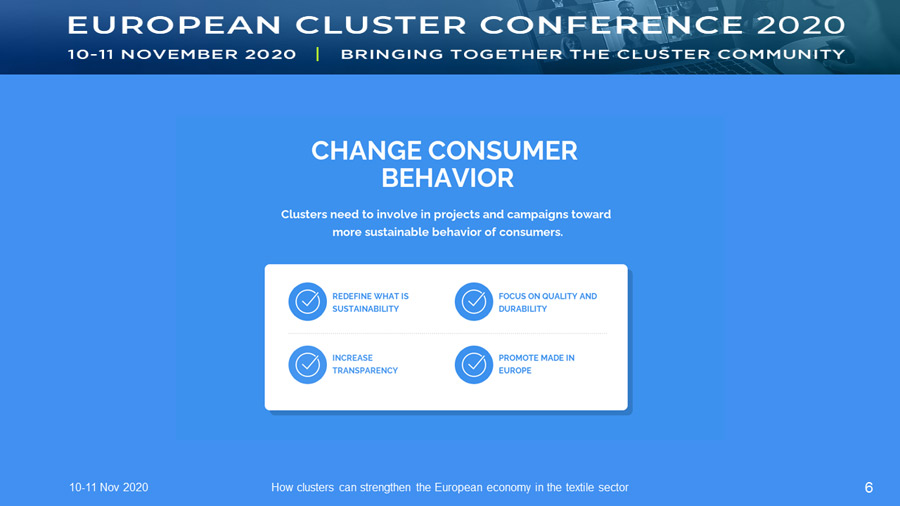
Here I have selected powerful messages from different campaigns about sustainability putting the emphasis on QUALITY OVER QUANTITY, TRANSPARENCY and SUSTAINABLE and CIRCULAR FASHION. Clusters can join existing campaigns or create new ones.
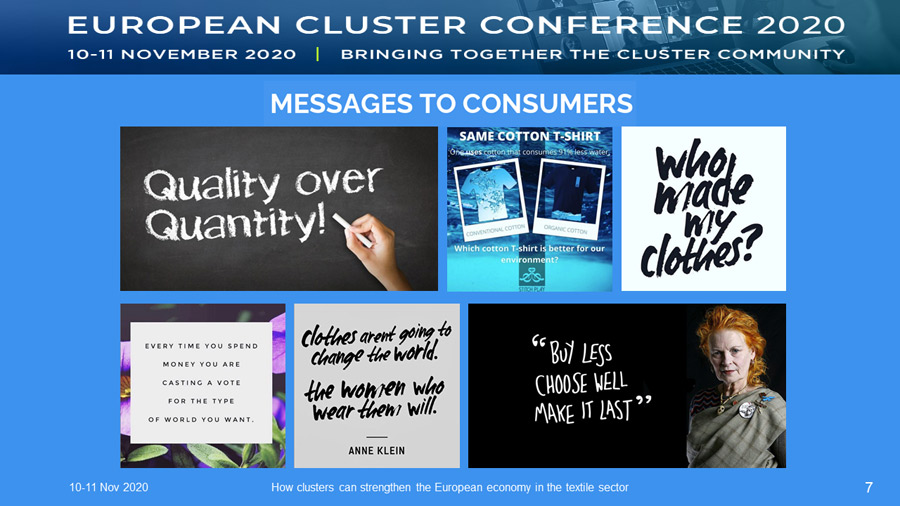
Part of sustainability is boosting local manufacturing. A 10% decrease in French and German imports of apparel would represent the equivalent of an 8% boost in European apparel manufacturing turnover. To support local manufacturing clusters from different European countries can cooperate and increase the interaction between their members in order to form new value chains of completely made in Europe products. They also have a leading role in helping SMEs to innovate and get certified. All this will help keeping the jobs in Europe and at the same time reduce environmental impact of transporting materials and products at long distances."
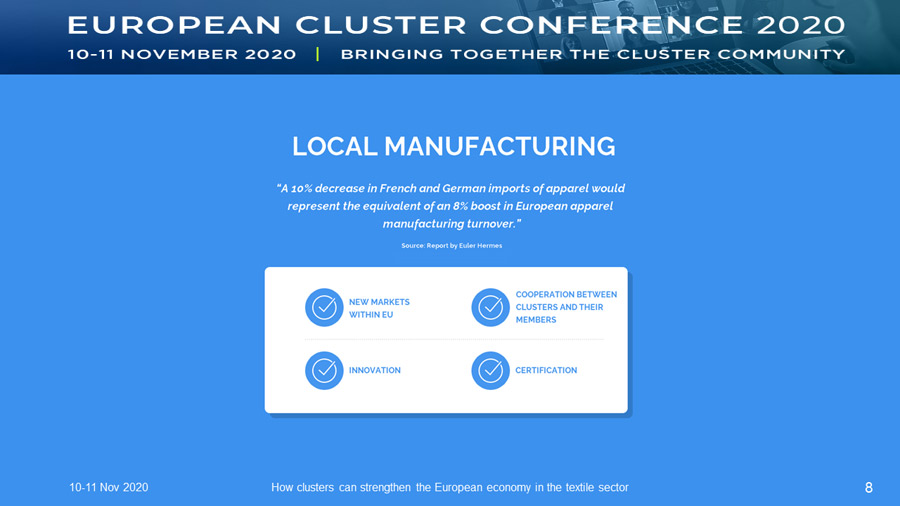
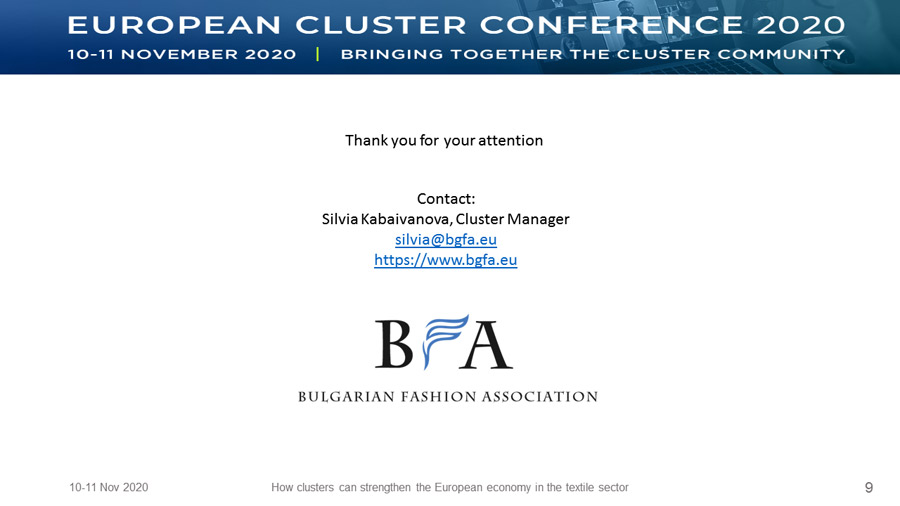
After that there was a discussion among textile cluster leaders, attended by Enrico Venturini - Cluster Manager at Next Technology Tecnotessile - Tuscany Fashion Cluster, Josep Casamada - Project Manager at AEI Tèxtils, D.B.R.K. Gupta Udatha - Oslo Cancer Cluster Director, Almudena Sanchez Escrich - Project Manager at FundingBox and others.
According to them, in order to strengthen Textile industrial ecosystem clusters need to:
- Leverage on Circular Economy approach, also in terms of business models
- Implement capacity building to their members
- Textile clusters also have a role in relation of reskills and upskills of the work force in relation to the circular transition of the textile industry - we have for ex such a project now that started in ESF re:skills Textile and Fashion 2030 - sustainable skills for the future. Also important within the context of the pandemic crisis
- Use of European projects to enforce collaboration at a broader level-cross sectoral and cross-border.
- Tool to connect SMEs to other peers in EU ecosystem to generate opportunities, particularly in pandemic moments.
- Support the recovery and exit strategy of pandemic with growth (circular, digital, internationalization)
- Support the New normality (after-COVID) that will be different than old-normality based on what we learnt during the pandemic (digital tools such as virtual events, virtual missions). Mix of virtual-real tools in trade fairs/missions, other events.
- Look at the transition of the textile industry in view of societal challenges and to work with missions - clusters can work as drivers for change
- To move from connectivity - to interconnectivity between different clusters as linked to a variety of knowledge areas/areas of strengths. It is important to include civil society and to build trust to support the move towards sustainable consumption.
Clusters need the following policy instruments to strengthen Textile industrial ecosystem
- Need to consider textile beyond fashion (technical textiles, home textiles, etc.) as they can provide higher added value.
- Promote Direct grants in cascade funding, easy applications and low burden, to tackle innovation in major issues: circular economy, sustainability, recycling,
- Use clusters for capacity building of SMEs
- Continue supporting ESCP like projects to strengthen cluster ecosystems and its members
- Promote cross-disciplinary research (materials, chemistry, digital, etc.)
- Support to implement traceability mechanisms
- Support to implement reskilling/upskilling
Source: Be Global Fashion Network
Read: 2675 times © Fashion Lifestyle Magazine, issue 109, November 2020
MORE PUBLICATIONS:ISSUE 105: DIGITAL SOLUTIONS IN THE TEXTILE BRANCH
ISSUE 101: TIME FOR A FASHION (R)EVOLUTION
ISSUE 98: TINTEX introduced Naturally Clean
ISSUE 97: Wardrobe of the Future - a collaboration of FashNerd and Munich Fabric Start
ISSUE 35: DRESS WITH…CHOCOLATE




